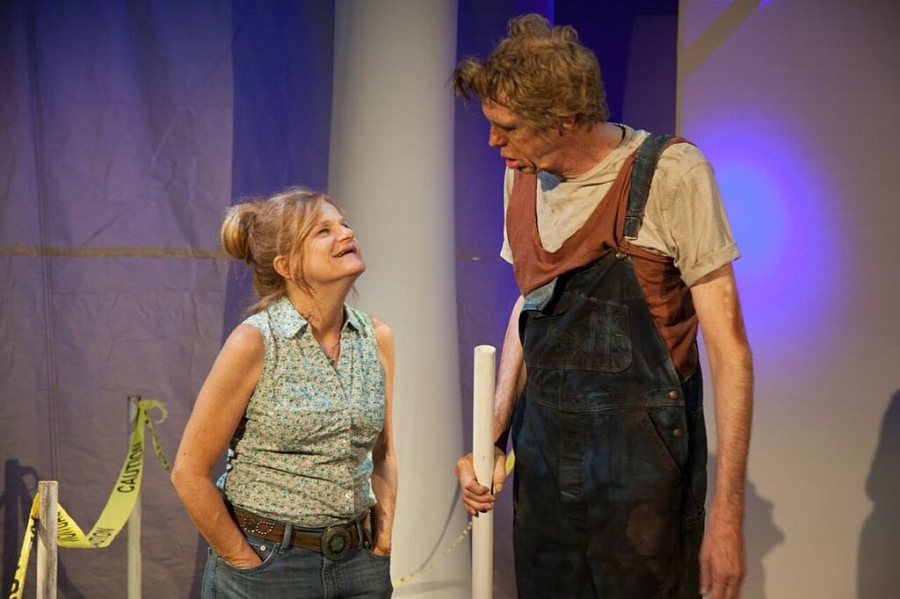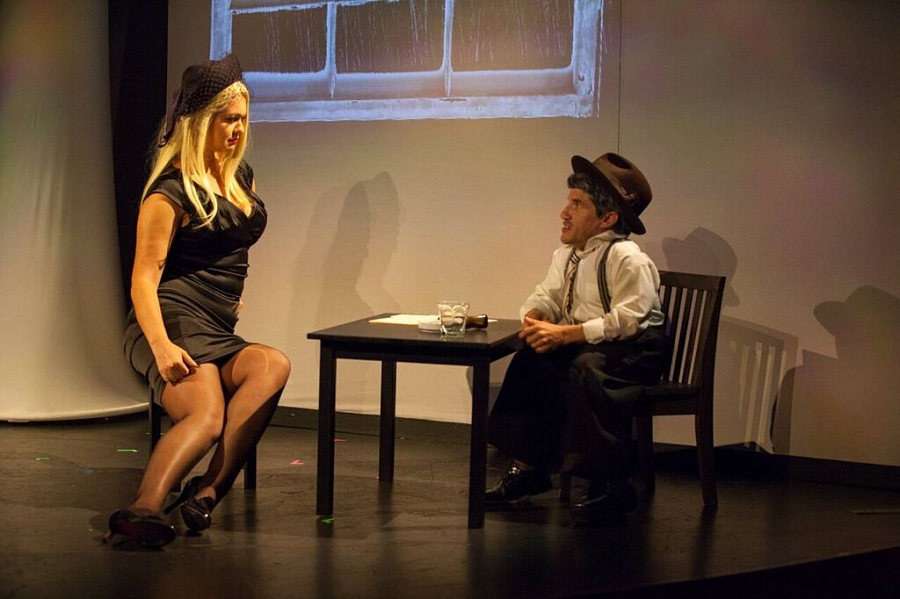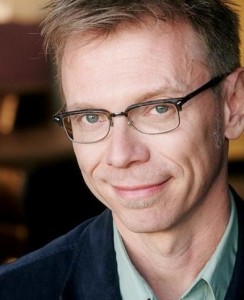Ask the average person on the street to name a science fiction film, and you’re not likely to have a shortage of answers: In movie theatres this month alone, you’ll find Insurgent, Ex Machina, Avengers: Age of Ultron, Home, The Age of Adaline, San Andreas, Mad Max: Fury Road and Tomorrowland. Ask for names of sci-fi TV shows and you’re likely to get a lengthy list. Even the dusty topic of science fiction radio drama will immediately conjure four little words: “War of the Worlds.”
But ask even a die-hard science fiction buff—not just the average person on the street, but a person whose passion for the genre rivals the white-hot intensity of a supernova—to name a single science fiction play, and you’re likely to get a glassy-eyed stare for an uncomfortably long time. And don’t expect a radically different response from a theatre aficionado. Sure, there’s R.U.R., the Czech play from 1920 which popularized the word “robot.” Some sci-fi greats have had their works staged, from Philip K. Dick to Ray Bradbury, and there’s been a trend in the last decade of so-called “geek theatre” that has found a following (the plays of Mac Rogers, Crystal Skillman and Qui Nguyen are among the prime exemplars). But until recently, the fact that science fiction theatrical productions have been a footnote in the long history of the stage is puzzling for a genre that has been around for centuries and has enjoyed commercial viability and critical attention in other media.
The creative folks behind Sci-Fest Los Angeles, now in its second year at the 99-seat Acme Theater in Hollywood, want to bring quality science fiction theatre out of the margins and into the spotlight. The core of Sci-Fest’s Mission Statement is “to produce an annual festival of new, beautifully realized, visually compelling sci-fi one acts featuring many well-known actors from your favorite sci-fi and fantasy franchises.”
As with last year’s kick-off festival, this year features two different lineups, each performance being an anthology of five one-acts. Program A began May 7 and continues through May 23, while Program B runs May 14–31. This year has also expanded to include a multi-night run of a staged reading of a classic Golden Age science fiction radio script, as well as celebrity readings of two different science fiction short story contest winners. Celebrities participating in some aspect of Sci-Fest 2015 include such genre figures as Armin Shimerman, Claudia Black, Veronica Cartwright, Dean Haglund, Tim Russ and Tucker Smallwood.
At the Mother’s Day Sunday matinee of Program A, the lights dimmed and the various flat-screened TV monitors and large projection screens flickered into life, and there was reassuring recorded image of Smilin’ Stan Lee, king of the cameos in the Marvel Comics universe, reminding the packed house not to even think about touching our cell phones and other interactive devices for the next two hours. Then Patricia Tallman of “Babylon 5” fame (and one of the doomed astronauts from Ray Bradbury’s dazzling Kaleidoscope, a high point of last year’s Sci-Fest) walked out onstage to make some housekeeping announcements, including the official news that Sci-Fest London has been given an official “go” for this October—a chance for some across-the-pond pollination.
Then the audience was whisked away for an afternoon of top-notch stagecraft creating the illusion of paralysis fields, blasters (shouldn’t it be Ensign Chekhov’s principle that a ray gun introduced at the beginning of a play will be fired by its conclusion?), alien invaders, moonlit revenants and fairy-tale detectives. There were no robots or time travel (this time), but there were plenty of laughs and scares, big ideas and intimate character moments, social commentary, and at least one BEM (bug-eyed monster).

After the performance, I sat down with some of the key players in this year’s Sci-Fest to talk about their work. They included:
- David Dean Bottrell, science fiction enthusiast, cocreator of Sci-Fest (along with producers Michael Blaha and Lee Costello), and returning Sci-Fest actor, bringing his characteristic man-with-a-secret edginess to the lead in Turnover, a twisty morality tale involving an interview in a future prison facility.
- Joel Silberman, an earnest young playwright whose Human History is a satirical allegory about racial identity in a distant future where having human ancestry is not necessarily a source of pride.
- Dale Dickey, famous for her earthy humanity and quirky humor, which she brings to the role of a homespun huckster in The Lunchtime Show, about a horrifying roadside attraction named Baby, a giant space bug (its spiny exoskeleton designed by Melissa Doss, late of “Jim Henson’s Creature Shop Challenge”).
- Mark Povinelli, riveting as hardboiled gumshoe Jack Horner in an adaptation by Michael Bernard of celebrated bestselling fantasist Neil Gaiman’s short story, The Case of the Four and Twenty Blackbirds.
- Angeline Rose Troy, back for her second year as a Sci-Fest performer, having a ball as the hypersexual femme-fatale client, Jill Dumpty (among other roles), in Gaiman’s crowd-pleasing fairy tale/detective pastiche mashup.
Here’s a highly condensed version of some of their insights on science fiction, the theatre and Sci-Fest:
AMERICAN THEATRE: Two of the offerings in this year’s Sci-Fest, Four and Twenty Blackbirds and The Departed, based on a story by horror superstar Clive Barker, wouldn’t be called science fiction by some people: One is essentially a fairy tale fantasy and the other is a Halloween ghost story. Have you strayed from your mission statement in your second year?
ANGELINE ROSE TROY: I think any story that takes you into another world is science fiction.
DAVID DEAN BOTTRELL: Would you like the official response? As soon as we opened up for submissions, we very quickly discovered that there are a great many types of stories that fall under the science fiction umbrella, and they include apocalyptic stories, fantasy stories, superhero stories. Frankenstein is theoretically the first science fiction novel, but most people think of that as a horror novel because it’s about monsters and all that. But it’s actually the first one that we’re really aware of about science going berserk and playing with the laws of life and God and existence. We didn’t try to rebrand and say, “Oh, it’s the Los Angeles Science Fiction, Fantasy, Comic Book, Blah Blah Blah.” We just kept it under the science fiction umbrella.

Neil Gaiman’s work, for instance—it’s very similar to the work of Ray Bradbury, who sometimes wrote stories about spaceships and astronauts and aliens, and sometimes he wrote about bizarre carnivals that come through town or odd little worlds that kind of collided with each other—much like “The Twilight Zone,” another example of that. They would have a spaceship one week, and the next week some poor person happened to knock on the wrong door because their car broke down, and then they were encountering some bizarre creature of some kind. An amazing array of things fall under the circus tent of science fiction.
JOEL SILBERMAN: I was chatting with some friends last night who said, “Gosh, love that piece. Not sure it’s science fiction, but who cares?” They’re on a continuum. These nursery-rhyme morality plays were proto-science fiction before there was actual science. There’s no coincidence that H. G. Wells and these sci-fi luminaries start to come out around the boom of modern technology. The precursor to that, the embryo of that, are fairy tales. Now we take our technology and turn it into a morality play and take the science fiction and infuse it into that. It takes you into another world to tell a story about our world.
There was a lot of humor on display in many of the pieces today. Where do science fiction and comedy share common ground?
MARK POVINELLI: Science fiction has such a breadth of an umbrella. Tragedy and comedy are very close together, and if you’re talking about apocalyptic pieces, which is one of the go-to science fiction [concepts], right around the corner of that is farce, and we’re pretty close to farce in our piece. Comedy is always a great way to deliver a message. And if there’s a message buried in science fiction, which I think most of it obviously has, then we try to find that message through comedy.
TROY: David’s piece (Turnover) is very serious and very profound, and then there are these little moments that take you by surprise and make you laugh, and you realize, we are all human at the end of the day, and I think comedy is what brings us together as a people.
Why do you think that science fiction has not made a big impact in the theatrical world before now?
DALE DICKEY: You’re right—there really aren’t science fiction plays. Why not?
SILBERMAN: I think people often see science fiction as a kind of low-culture thing and theatre as a high-culture thing. I also think that science fiction as a genre is generally linked with modern technology and the birth of film. So when you have these fantastic things that are happening and a fantastic new technology called film where you can illustrate those things—some of the first famous silent films and this kind of stuff—that technology seems to go really well together, and in a way it kind of makes sense that those technologies are just a regular part of our world. There’s nothing amazing about going to a movie anymore—nobody remembers before there were movies. Now, it’s like, “Well, okay, you can do sci-fi onstage. You can do sci-fi in a movie.” It’s not like the medium is incredible anymore. You can have the medium fit the story.
How do you respond to people who say, “I’m not a science fiction fan, why should I come to this play? Is there anything here for me?”
DICKEY: To boldly go where you have never gone before! (laughs) I grew up on “Star Trek.” I was so in love with Captain Kirk and Mr. Spock. I wouldn’t say I’m a sci-fi fanatic, but I’ve always believed that there’s something out there besides ourselves. Technology sometimes scares me with how quick it’s going, but the theatre will always stay here, and the fact that we’re doing science fiction in the theatre—listening and hearing something that’s different, that’s strange—not that it’s just a morality play and that you’re going to learn something from it, but it’s a different world.
SILBERMAN: I had a friend come last night who gave me the best compliment. She said, “The best compliment that I can give you is that I don’t have to lie. I really enjoyed this, and I will be totally up front with you, I was not looking forward to it.”
BOTTRELL: Last year, I had to drag my agents and managers to come and see it. They said, “We loved it, and we did not want to come. We are not science fiction fans. But all the stories were so compelling.

Science fiction used to be considered a lowbrow, pulp entertainment. The movies got there first. Hollywood saw the potential in this right away because of how much kids loved it and how it connected to people’s imaginations. Over time, especially in the last 25 years, television and film have turned science fiction into an action genre and they’ve made a lot of money doing that. But if you hearken back to Bradbury and Rod Serling and Gene Roddenberry, and a lot of people who were first beginning to do that type of storytelling to a mass audience, those stories were incredibly human, and they were a reflection of the times in which they were written. Things like the Cold War, the nuclear bomb, civil rights—things that were scaring the hell out of people in those days were reflected in those stories, and they were a teaching tool.
Ray Bradbury was one of the first people who did short science fiction plays for stage, and we did one of his last year, Kaleidoscope. We wanted to make sure we opened with one of his plays. And then, historically, to come back, we’re doing a revival of Efficiency, which is the oldest science fiction play that anybody knows of, from 1917.
And a lot of theatres are starting to do it now. There’s a theatre in Chicago that does nothing but sci-fi. And there’s Sci-Fest London, by God!
Even some people who embrace science fiction would say that it’s a genre known for strong plotting and heady ideas but not necessarily for three-dimensional characterization and sparkling dialogue, two critical elements in a play. How would you respond to that?
BOTTRELL: If you’re talking about old-school, like ’40s pulp stuff, it’s very plot-heavy, and it’s a lot of devices and a lot of hardboiled characters that might be a little thin when it comes to dimension. Once these stories moved into being performed in front of a camera or in front of an audience, I think that the writers stepped up. In, say, the cast of characters in “Star Trek” or Star Wars, we’re talking about some pretty remarkable and memorable characters that people absolutely wrapped their hearts and minds around. I think things have changed a lot. One of the pieces that was an absolute inspiration for this festival was Ursula K. Le Guin’s The Wife’s Story (from Sci-Fest 2014). I read it and I said, I’m going to find an actor to bring that to life on stage, and I did manage to talk a Tony-winning actor, L. Scott Caldwell, into doing that piece. I just happened to run into her and I said, “You don’t know me, but I’m going to give you this piece of material, and when you read it, you are not going to be able to say no to me.” That is exactly what happened, because it was an incredible character, and the piece is such that you couldn’t do it as a film or a television show because of the nature of the reveal at the end. But it was ideally suited for the stage.
Science fiction is often about the future. What’s in the future for Sci-Fest?
BOTTRELL: Well, of course, we still have Program B to come, which starts May 14. That’ll include Moby Alpha, with Chuck Armstrong and Charlie Stockman, and it’s one of the most hilarious things I’ve ever seen. It’s Moby-Dick in space, and they play all the parts, but you don’t even have to know Moby-Dick to enjoy it. And we found what we believe might be the oldest science fiction play, Efficiency, from 1917, almost a hundred years ago, and which might be the first-ever reference to a cyborg. It has some powerful things to say about killing and warfare that are still very relevant today.
Looking on down the line, there’s Sci-Fest London. I’m a big admirer of “Black Mirror.” The original “Twilight Zone” explored the fears and anxieties of its day and age, and “Black Mirror” does the same really effectively for this day and age. I’d love to be able to tap into that talent pool. In fact, our submissions have been largely American, and I’d love to expand our material to include stories from all over the world. And we’d like to maybe do something with animated short films.
Warren Scherffius has been a science fiction fan since being traumatized by a community center screening of Earth vs. the Flying Saucers as a wee lad. The first book he ever checked out of his elementary school library was Ray Bradbury’s R is for Rocket. Since then, he’s had an eye on the future, because that’s where he intends to spend the rest of his life.


